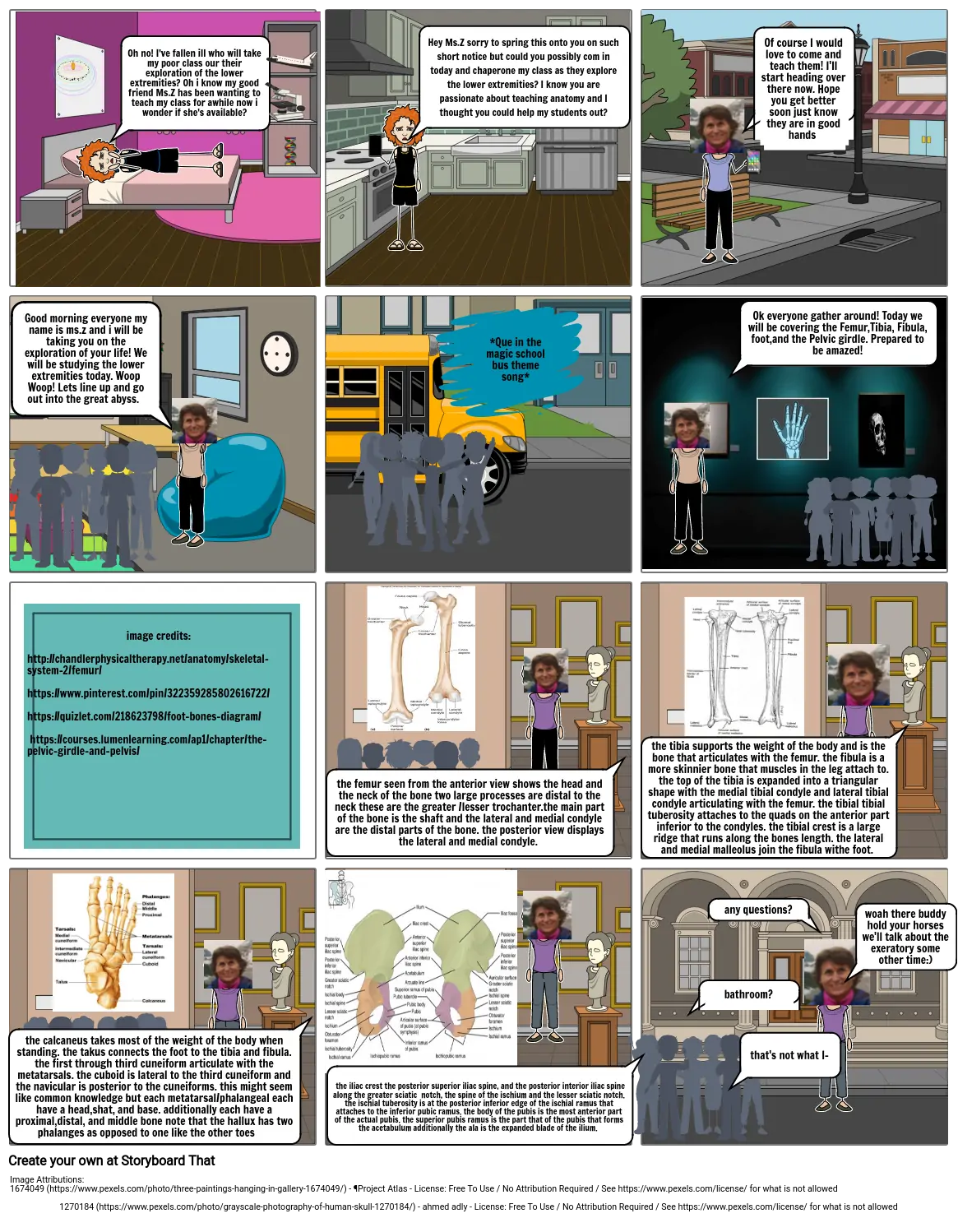ske;aton stories

Süžeeskeem Tekst
- Oh no! I've fallen ill who will take my poor class our their exploration of the lower extremities? Oh i know my good friend Ms.Z has been wanting to teach my class for awhile now i wonder if she's available?
- Hey Ms.Z sorry to spring this onto you on such short notice but could you possibly com in today and chaperone my class as they explore the lower extremities? I know you are passionate about teaching anatomy and I thought you could help my students out?
- Of course I would love to come and teach them! I'll start heading over there now. Hope you get better soon just know they are in good hands
- Good morning everyone my name is ms.z and i will be taking you on the exploration of your life! We will be studying the lower extremities today. Woop Woop! Lets line up and go out into the great abyss.
- *Que in the magic school bus theme song*
- Ok everyone gather around! Today we will be covering the Femur,Tibia, Fibula, foot,and the Pelvic girdle. Prepared to be amazed!
- image credits: http://chandlerphysicaltherapy.net/anatomy/skeletal-system-2/femur/ https://www.pinterest.com/pin/322359285802616722/ https://quizlet.com/218623798/foot-bones-diagram/ https://courses.lumenlearning.com/ap1/chapter/the-pelvic-girdle-and-pelvis/
- the femur seen from the anterior view shows the head and the neck of the bone two large processes are distal to the neck these are the greater /lesser trochanter.the main part of the bone is the shaft and the lateral and medial condyle are the distal parts of the bone. the posterior view displays the lateral and medial condyle.
- the tibia supports the weight of the body and is the bone that articulates with the femur. the fibula is a more skinnier bone that muscles in the leg attach to. the top of the tibia is expanded into a triangular shape with the medial tibial condyle and lateral tibial condyle articulating with the femur. the tibial tibial tuberosity attaches to the quads on the anterior part inferior to the condyles. the tibial crest is a large ridge that runs along the bones length. the lateral and medial malleolus join the fibula withe foot.
- the calcaneus takes most of the weight of the body when standing. the takus connects the foot to the tibia and fibula. the first through third cuneiform articulate with the metatarsals. the cuboid is lateral to the third cuneiform and the navicular is posterior to the cuneiforms. this might seem like common knowledge but each metatarsal/phalangeal each have a head,shat, and base. additionally each have a proximal,distal, and middle bone note that the hallux has two phalanges as opposed to one like the other toes
- the iliac crest the posterior superior iliac spine, and the posterior interior iliac spine along the greater sciatic notch, the spine of the ischium and the lesser sciatic notch. the ischial tuberosity is at the posterior inferior edge of the ischial ramus that attaches to the inferior pubic ramus. the body of the pubis is the most anterior part of the actual pubis. the superior pubis ramus is the part that of the pubis that forms the acetabulum additionally the ala is the expanded blade of the ilium.
- bathroom?
- any questions?
- that's not what I-
- woah there buddy hold your horses we'll talk about the exeratory some other time:)
- Image Attributions:1674049 (https://www.pexels.com/photo/three-paintings-hanging-in-gallery-1674049/) - ¶Project Atlas - License: Free To Use / No Attribution Required / See https://www.pexels.com/license/ for what is not allowed1270184 (https://www.pexels.com/photo/grayscale-photography-of-human-skull-1270184/) - ahmed adly - License: Free To Use / No Attribution Required / See https://www.pexels.com/license/ for what is not allowed
Loodud üle 30 miljoni süžeeskeemi

